Finance & Global Affairs _|_ Issue 8, 2018
THE REVIVAL OF THE COMMONS
Political strategist David Bollier explains how a new economic/cultural paradigm is challenging the increasing ‘enclosure’ of wealth and human creativity
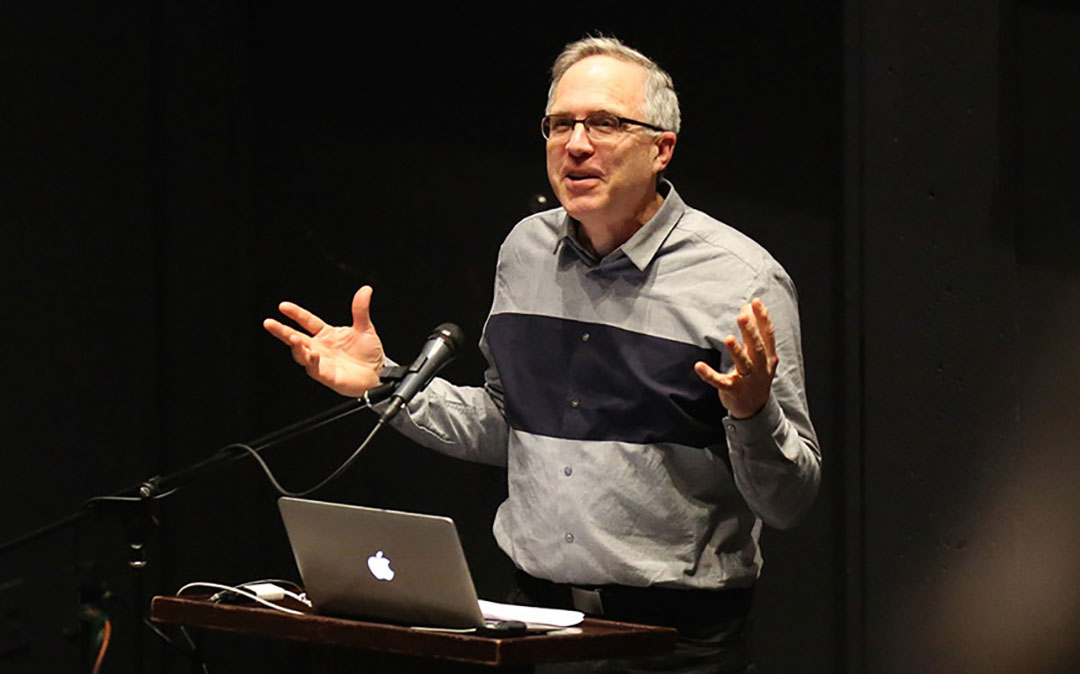
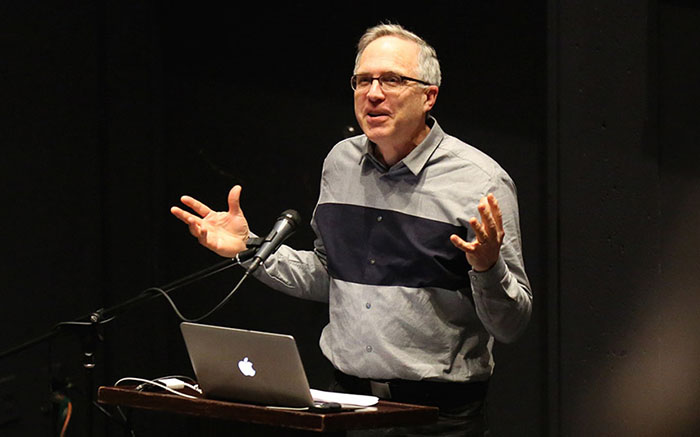
THE REVIVAL OF THE COMMONS
Political strategist David Bollier explains how a new economic/cultural paradigm is challenging the increasing ‘enclosure’ of wealth and human creativity
David Bollier is a leading figure in the international commons movement. He spent many years working for various policy advocacy groups in Washington DC before, in 2010, co-founding The Commons Strategy Group with Silke Helfrich and Michel Bauwens. He has written eight books, including the excellent introduction ‘Think Like a Commoner’ (2014), and is now Director of the ‘Reinventing the Commons Programme’ at the Schumacher Center for the New Economics (US). In this interview with Jane Clark, he explains how our humanity is being restricted by the increasing commodification not only of land but of social and intellectual space, and how ‘commoning’, based upon values of sharing, connection and cooperation, presents a feasible alternative.
 Jane: The idea of ‘the commons’ has been around for some time now, and it is becoming more and more influential. It has even been suggested that it will be the next ‘grand narrative [/]’ which will define our future political and social life. But as I prepared for this interview, I found that many people are still not aware of it.
Jane: The idea of ‘the commons’ has been around for some time now, and it is becoming more and more influential. It has even been suggested that it will be the next ‘grand narrative [/]’ which will define our future political and social life. But as I prepared for this interview, I found that many people are still not aware of it.
David: I am not so surprised to hear this, because the commons is still a kind of ‘underground conversation’ carried on by irregular global networks of activists, academics and social projects. For them ‘the commons’ provides an explanation of a different way of being in the world, a different vision of emancipation, a different way of doing politics.
Jane: As I understand it, the central metaphor derives from what is now being called ‘the first age of enclosure’, which happened here in England in the Tudor period. The land which was shared by the peasantry – ‘the commons’ – was literally enclosed, fenced off, and transferred into the hands of landowners. Then later, this idea of private ownership became enshrined in economic and property rights theory by people like John Locke.
David: The idea of ‘the commons’ refers to more than just land. It can mean digital spaces; it can mean urban spaces; it can mean social spaces. It refers to a regime of self-government and management of shared resources. A commons is not the resource alone, as many economists seem to think; it is not just ‘un-owned resources’: it is the resource plus the community that governs it, plus a set of rules or protocols which regulate its use.
The English enclosure movement is definitely an important touchstone, an inspiration for talk about the commons today. But the idea has now been adapted and developed to become, as you say, a kind of ‘grand narrative’. It is attractive to me because it both allows a critique of our present system – of which enclosures are a major part – and provides a platform for constructing alternatives.
Jane: So what is meant exactly by ‘enclosure’?
David: Enclosure is the commodification and privatisation of our shared wealth. It means that things that were previously free for the taking, or collectively managed, pass into the hands of individuals or, in collusion with governments, are privatised and made available for market exchange. This process is cast as ‘progress’ by the capitalist system, and put forward as the way that human development happens – the way that wealth is generated. But in fact, it is often just a radical dispossession of people. It removes things from their organic context, be that a community or an ecosystem, so that they can be sold. So the commons is a story that helps us talk about what I think of as the great unacknowledged scandal of our times, which is the enclosure of the wealth that belongs to all of us.

Two billion people are still dependent upon the land, like these Vietnamese fishermen in Prek Toal Floating Village, Tonle Sap, Cambodia. Photograph: Terry Whittaker / Alamy Stock Photo
Jane: We are going to go on to talk about how this is happening with things like intellectual property and the internet. But I was surprised to learn that even in terms of the literal enclosure of land, there are still two billion people in the world today – that is, more than a quarter of the global population – who are dependent on collectively managed natural resources.
David: It is fascinating that modern economic theory does not regard subsistence economies as meaningful. That’s because there is no cash exchanged and no formal markets, even though people’s needs are being met. Subsistence commons are seen as potential or proto-markets that need to be developed in a western consumer sense. So in places like Africa, Asia and Latin America, we are currently seeing sovereign investment funds, hedge funds and speculators colluding with governments to take over lands which have historically been managed as commons – and actually, in many cases, managed very well. This land grab is going to cause the same kind of problems that the English enclosure system caused – the pauperisation of people, ecological exploitation, the cultural decimation of indigenous people. I call it ‘the tragedy of the market’.
Jane: You are making a reference, I believe, to the phrase ‘the tragedy of the commons’ which is still one of the first things that come up when you google ‘the commons’. Is this the idea that common ownership of resources necessarily leads to them being over-exploited?
David: Yes. The term ‘tragedy of the commons’ derives from an article written by biologist Garrett Hardin in 1968 [/], and for two generations now we have been trying to crawl out from under this fable. Hardin harkened back to an earlier 19th-century essay by William Forster Lloyd, who used a hypothetical example of the effects of over-grazing on common land to argue against communal sharing of resources.
Hardin talked about the commons as if it were a free-for-all regime where people could do whatever they wanted. But this is not what a commons is. A commons is a social system that manages resources sustainably, and which has regulations and boundaries that its members can enforce, through penalties if necessary, to make sure that the resources do not get over used. So a commons has ways of dealing with people who want to appropriate them for their own gain, or free-loaders who want to use them without playing a part in their upkeep.
Hardin fundamentally misrepresented the commons, but this was fortunately corrected by the extensive scholarly research of Professor Elinor Ostrom [/], a political scientist working at Indiana University, who won the Nobel Prize in 2009 for her life’s work on this subject. She essentially showed that the ‘tragedy’ of people over exploiting resources is not inevitable. But the term remains in circulation because politicians and advocates of property rights still find it a very useful parable when they are trying to discredit collective management and control.
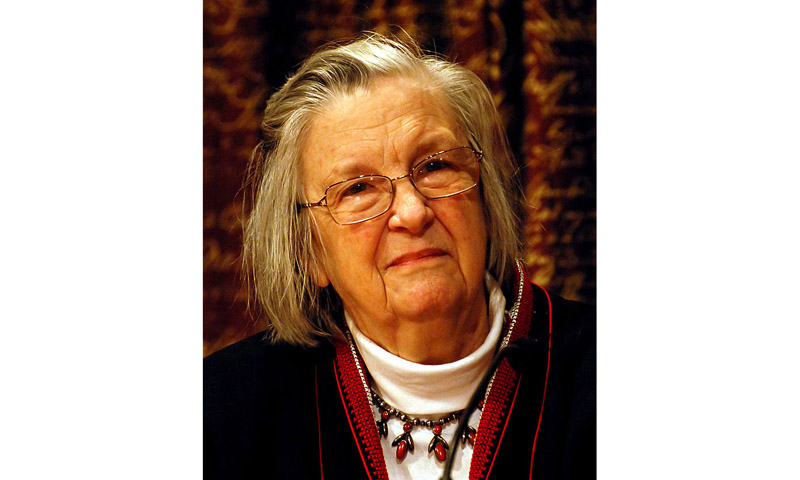
Elinor Ostrom at the Nobel Prize press conference in 2009.
Photograph: Holger Motzkau 2010, Wikipedia/Wikimedia Commons
Jane: Can you give us some examples of successful commons projects?
David: In New Mexico, there is a system of community-managed water control known as acequias [/]. These water systems, which derive from the ways in which indigenous Americans managed water, have been sustainable in a very arid region. What is remarkable is that the commons has been able to steward the water in ways that do not over deplete it. It has statutory recognition by the state government, so this is a rare example of a state-sanctioned commons. Its success stands in stark contrast to the suburban and urban areas around it, which are grossly over using the water relative to what the ecosystem can replenish.
There are many similar examples around the world of sustainable stewardship of shared resources. Elinor Ostrom in her landmark book, Governing the Commons, mentioned a great many – from the zanjeras [/] in the Philippines to the communal tenure systems in the high mountain meadows in Switzerland [/], and the huerta irrigation institutions in Spain. All these have been successfully running for a long time – in many cases, for centuries.
Until Ostrom came along, these social systems had been understudied by conventional economics with its focus on the atomistic individual, homo economicus. The ontology of economics cannot really understand collective action because the presumption is that individuals matter more than groups, and every individual is supposedly rational and calculating in advancing his or her material self-interest. This is in contrast to the empirically obvious fact that people in many communities can and do negotiate their way to collectively managing their wealth.
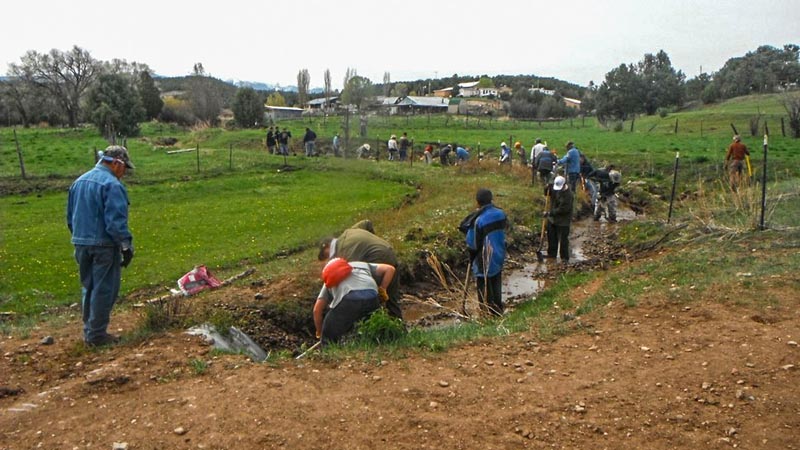
The commons community at work on the acequias in Chamisal, New Mexico, on Acequia Day 2018. Read more [/]. Photograph: Juliet Garcia-Gonzales with support by the NM Acequia Association
The Second Age of Enclosure
Jane: It seems ironic that at the same time as these examples are becoming known, we seem to be going through an intensification of the process of privatisation. Some people have gone so far as to call this ‘the second age of enclosure’.
David: Yes, indeed: there has been an enormous extension of the scope of property rights over the last few decades. Enclosures have been moving into areas that are often intangible – such as knowledge, business models, sounds, and even smells – which are more subtle than enclosures of land.
Let me go through a few examples. One area is the term of copyright on materials produced by writers and artists. In the USA this has now been extended to the life of an author, plus 70 years. This means that I can scribble something on a piece of paper and it will be copyrighted to about the year 2200, which is just absurd. This is supposedly needed as an incentive for me to create. There are attempts to marketise the internet; the whole net-neutrality debate in the USA [/] concerns whether companies will have proprietary control over what is happening online.
Twenty percent of the human genome is now patented for private purposes, which is discouraging a lot of research into medical treatments and biological functions. In urban regions developers and absentee investors are controlling how cities are developing; they are taking over public spaces and acquiring a lot of infrastructure. There are many roads which used to be publicly managed that are now private toll roads.
The list goes on and on. We have privatisation of public information, public lands, the airwaves that are used for broadcasting, and federal drug research. In the United States, the publishers of court decisions can now claim copyright over the official publications even although the decisions are funded by taxpayers. Companies are patenting nano-matter, and algorithms embedded in software can be copyrighted. President Trump has even expressed the hope that private companies will go to the moon and lay claim to resources there.
Jane: I know that all this is leading to some extraordinary restrictions. For instance, in some places where genetically modified crops have been introduced, it has become illegal for people to gather and share seeds [/]. This means that indigenous peoples are prevented from growing the crops that they have relied on for centuries, or even millennia.
David: Yes, even in Europe there are efforts now to criminalise the sharing of seeds. The problem is that the law – state law – is often employed in the service of enclosure. However, there are also some instances where the law has been used to protect the commons. These amount to what you might call ‘legal hacks’. An example is the Creative Commons licenses [/], which allow authors to retain copyright over their works, and be acknowledged for it, whilst still making them freely available for others to copy, share and modify. The General Public License for free and open software [/] does the same thing for software code. The point of legal hacks is to use the existing legal system against its intended purposes in order to protect the rights of commoners to share.

Laxmamma, the seed keeper of a village collective (sangham) in Andhra Pradesh, which is resisting the restrictions imposed by the manufacturers of GM crops by setting up its own system of preserving and sharing seeds. Read more [/]. Photograph: Eleanor Benthall
Jane: Why do you think that enclosure is becoming so much more pervasive in our present time?
David: Because the political system has bought into the economics of capitalism and we have what I call a ‘market–state alliance’. Enclosure is so prevalent that there has not really been much public discourse about what is happening. It is just seen as inevitable, and even desirable. So there is a lot of debate about whether resources like water, power or transport should be managed by the state or by private enterprise, but really, this is a specious choice. The larger debate, which has not been joined at all, is whether these things should be self-managed as commons, outside of the direct control of government or markets. Part of the point of the commons is to provide a language for naming this process of privatisation and state control, and to point out that there are feasible alternatives.
Jane: I was interested in what you say about Marxism in your book Think Like a Commoner. This has been the alternative ‘grand narrative’ to capitalism during the past century, and some people would argue that the radical extension of capitalism in recent decades has happened because the argument for socialism has ceased to be effective.
David: Marx was a product of his times. He recognised what had happened during the age of enclosure but, quite understandably, he did not see peasant commons as the future. He thought the process of industrialisation was more important, and put his money on the development of worker cooperatives. But historical processes have to play out in order to see what works and what the potential for change really is. Things look very different now.
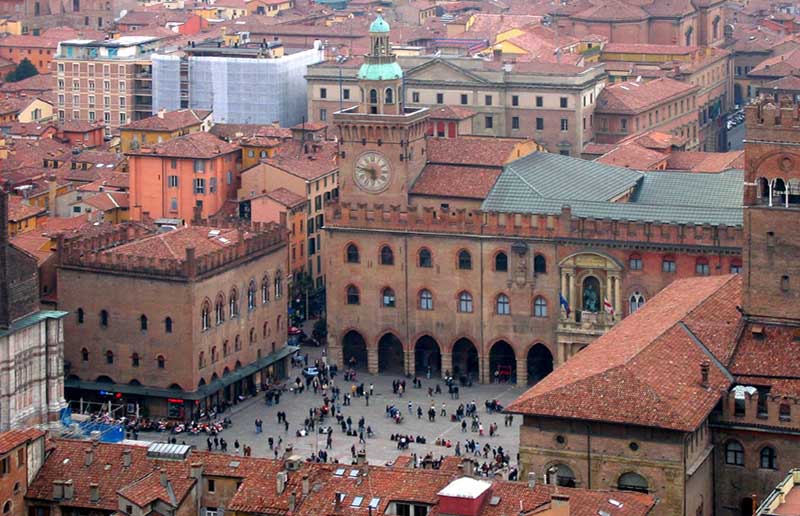
The city of Bologna in Italy has pioneered a new approach to managing urban spaces. In 2015 it set up the Bologna Regulation on public collaboration for urban commons, which has initiated more than 90 citizen-led projects aimed at improving the city. Read more [/]. Photograph: Gaspa (Flickr) via Wikimedia Commons
Cooperation and Flourishing
Jane: I can see how the enclosure of land could be wealth-generating from a certain perspective. But in other cases, it seems that enclosure must be directly counter-productive. You talk a lot about what is happening within academia, where openness and sharing is surely a necessity for successful work.
David: Well, enclosure clearly does not support the historic goals of academia or the aims of science. But it is very consistent with the goal of corporations who want to use academia’s research for their proprietary benefit at minimal or no cost. Nowadays, there are lots of corporate partnerships with academic departments which allow these companies to appropriate the resulting research, and deny it to their competitors or to other academics and the public.
My feeling is that university administrators have not shown the kind of leadership or vision that is needed to reclaim control of the very resources that they (or often, we as taxpayers) are financing. Why do they allow their researchers to publish their papers in commercial journals, which then copyright them and sell them back to university libraries at exorbitant subscription rates? There are many alternative ways of sharing knowledge within a discipline or to the public, such as open-access publishing or, more broadly, open educational resources (OER) such as open text-books [/] or open data commons [/]. These are still at a rudimentary stage, but they could be developed much further.
At the same time, there are some causes of enclosure that are driven by academia itself – mainly, cultural practices like the governance privileges of senior faculty, and archaic criteria for tenure and promotion – which may inhibit an ethic of sharing and collaboration. Many of these practices are being undermined by the internet and digital technologies. It is just so enormously more efficient and innovative to share knowledge than to lock it up.
Jane: This aspect of greater efficiency and productivity seems to be one of the most important features of the new conception of the commons. And also the idea of flourishing in its widest sense: human flourishing – meaning the flourishing of our humanity. Why do you think that commons are more conducive to this than a market-driven economy?
David: A key idea of the commons is ‘inalienability’. This means that something is not for sale. Market categories of control and management are becoming so pervasive in human life – especially with the development of software algorithms, big data and artificial intelligence – that they are now in danger of overrunning basic human needs. Twitter, for instance, does a lot of data-mining of its users, and there are literally hundreds of categories of demographic cohorts which they sell on to their advertisers. This is their ontological view of humanity – and it is profoundly dehumanising. This is now going on in so many parts of the world that the managers of big data, like Google and Facebook, are superimposing these values on us as they seek to monetise our personal data.
So it is important that we begin to assert that there are some parts of our life which are inalienable and not governed by market norms. The commons is about carving out protected spaces for a different kind of humanity to emerge. This is both a personal, existential necessity, and a challenge to create new types of institutions.
Jane: So how would you define this different kind of humanity?
David: It is one that is developed in relationship with others. We are not self-made in the way that the market presumes that we should be; we are not homo economicus. Identity and human flourishing come about through having a connection, a relationship with others, including non-human life and the earth itself. A commons is a vehicle for discovering our common purposes together in an organic, place-based context. This general scenario is quite different from a market culture where each of us is seen as a fungible unit of humanity that can be deployed here, there or anywhere on the planet. Meaning arises out of relationships, and the market as a vehicle for impersonal transactions does not provide that; it provides commodities through which we can, at best, buy a kind of identity.
Jane: You have talked about new research which is showing the importance of this cooperative side of human nature in our evolution. Neo-liberal economics, by contrast, goes hand-in-hand with a more Darwinian idea of progress.
David: I think that Darwin himself saw a lot of cooperation going on. But it is also true that Darwinism came of age just as industrialism – at least in England – came of age, and so a lot of categories of thought, cultural categories of thought, were superimposed upon Darwinism to emphasise the selfish, competitive aspect of the theory. However, many contemporary evolutionary scientists such as David Sloan Wilson and Martin Nowak, are pointing out that cooperation is far more pervasive in the history of the human species than the brutal competitiveness of neo-Darwinism, and that it has been essential to our survival.

Martin Nowak. Photograph: NBeale at English Wikipedia
via Wikimedia Commons
Jane: There is a very interesting quote [/] from Martin Nowak, Professor of Biology and Mathematics at Harvard University, on this:
Perhaps one of the most remarkable aspects of evolution is its ability to generate cooperation in a competitive world. Thus we might add ‘natural cooperation’ as a third fundamental principle of evolution besides mutation and natural selection. (‘Five Rules for the Evolution of Cooperation’, p.1563)
David: Yes. One of the most important insights is that evolutionary development occurs not just at the individual level of natural selection, but at the group level as well. So while predatory, self-serving individuals may succeed within groups, a group committed to collective action that cooperates within its own members, beats selfish groups in terms of evolution. So there is some fascinating historical evidence which shows that cooperation is really our fate, as opposed to the two-hundred-year epiphenomenon of homo economicus. Of course, a larger question is the purpose to which cooperation is put – whether to advance the usual capitalist accumulation or to develop new types of social cooperation and institutions.

Wikihouse [/] is an open source project for designing and building houses that can be constructed by people with no formal training. This example was built by the Fountainbridge Canalside Initiative in Edinburgh. Read more [/]. Photograph: Savan Panchal
Jane: Anyone who has ever attempted any kind of communal action will know only too well that there are a whole host of difficulties which arise between people when they try to work together. It is not generally easy to reach agreement, to work out the protocols for actions, etc. So you have made it clear that the commons is not a utopian vision: it does not pretend to have all the answers.
David: Absolutely. The idea of the commons is not a magic pixie-dust for solving all our problems. However, what it does do – unlike a lot of large-scale structures of politics – is to provide a serious vehicle for deliberation and taking account of other people’s views in order to come to a common purpose. This can work especially well at a smaller scale, but it can also apply to larger organisations.
One of the criticisms levelled at the commons is that it can’t scale up, meaning that it is stuck with operating only at a very local level. It is true that it won’t scale in the way that we are used to, in a hierarchical way to create a single, large organisation. But what can happen is emulation and federation. Lots of smaller scale commons can be in communication with one another and build on each other’s innovations, as we see in many digital spaces where countless open-source communities are collaborating with each other.
In this way, we can have both meaningful self-governance and production through commons, but, also operate on a larger scale. The term that has been used to describe this is ‘cosmo-local’ production [/]. This means global collaboration of knowledge and design through the internet in an open-source way, but local production using inexpensive, modular and locally sourceable materials without large transport costs. This is a different logic, a different pattern of behaviour, from the 20th-century industrial model of how you build and scale something.
I think this is definitely the future. There is a quote that I love from the Belgian designer Thomas Lommée [/]: “The next big thing will be a lot of small things”. This is what we are struggling to invent right now: how can a lot of small things interconnect and nourish each other without having large centralised bureaucracies directing them?
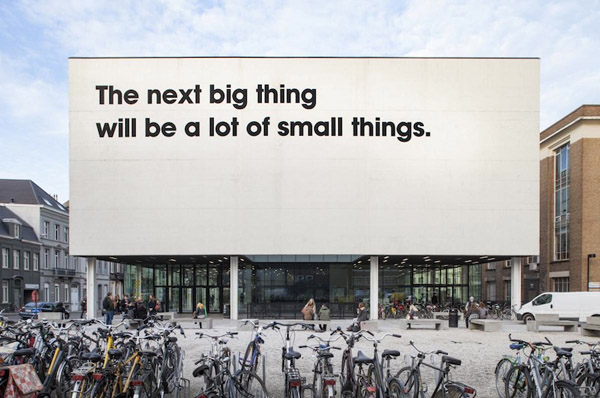
Thomas Lommée’s installation at the University of Ghent in solidarity with the Climate Summit in Paris, December 2015. Photograph: http://arthistoryteachingresources.org
Jane: We do have some examples of commons that work on a large scale, for example, Wikipedia. This seems to me to illustrate very well the importance of protocols, because it has very strict procedures for editing articles, and it is policed to prevent the information becoming corrupted.
David: Yes, it is remarkable that an organisation of such a size manages to operate as an open-access site. It has some governance issues, however: it is a very male dominated – younger male dominated – community, and there are also philosophical debates about whether its content should be inclusivist – meaning that virtually all content, however seemingly trivial, should be allowed – or whether it should be something that is more curated and editorially controlled. Wikipedia is still fairly young, so many problems of large-scale commons are novel and not yet fully resolved. The open-source software world has many of the same issues.
The Deeper Philosophy of the Commons
Jane: So would you say that the idea of the commons is most useful because it helps us to articulate things which had previously been rather invisible?
David: Absolutely. It helps to make many phenomena which until now have been radically disconnected or isolated culturally legible. The fact that seed-sharing in order to prevent proprietary control of the seed stock, can be seen as similar to code-sharing is an example. People can see that they share an identity as commoners who are fighting over-marketisation, and that they have a common aim in wanting self-determination and control over the resources upon which they depend. This phenomena is going on in countless different realms. The idea of the commons helps to provide a cultural framework, an historical context and a coherent philosophy for protecting the things that matter to them.
Jane: I understand that in the book you are currently working on, you will be taking the idea even further and presenting it as a kind of ontology.
David: While working with my colleague, Silke Helfrich, we found that we were both frustrated by the extent to which existing scholarly literature focuses so much upon resources, and uses so many economistic categories for talking about them. In our experience of working with lots of commoners, we have come to see it more as a social system. So we want to emphasise social dynamics, which will necessarily be interactive, personal, subjective, moral/ethical, historical and cultural.
We have devised what we call the ‘triad of commoning’ which consists of three major parts: social life, peer governance and provisioning. In each of these areas we have what we call ‘patterns’, which are basic dynamics that play out again and again in successful commons. The aim is to start talking about ‘commoning’ as a verb, a social practice and ethic, and not just ‘the commons’ as a resource – and certainly not an ‘unowned resource’. The real nature of the commons does not reside in the resource itself: it resides in the people who steward it.

Open Bionics [/] is a UK-based company developing the design and manufacture of artificial arms by 3-D printing. It makes its research and development freely available as an open access resource. Read more [/]
Jane: Would you feel that in, say, exploring what we mean by ‘humanity’, there is a spiritual dimension to the idea of the commons? For instance, the idea of caring and sharing, learning how to go beyond your personal identity, are central tenets of all spiritual paths.
David: I think that for most commoners the juxtaposition of God, or any kind of religious dimension, with the commons would be a bit jarring. But your question does bring up issues that I think are important. In this post-modern age, what is the ultimate source of authority, belief and trust? What defines our humanity and our relationship to the cosmos? These are legitimate, urgent questions of our time.
It seems to me that the idea of ‘humanity’ reflected in law and current political policies is a caricature. First, they see people only as individuals; secondly, as only materialistic self-seekers. These are very crude representations. I like to think that the commons provides a social space, as well as a physical one, for exploring a broader, more generous, cooperative vision of humanity. But this first requires a recognition that our identity, meaning and purpose, our connection to the earth, come through our relationship with others. That’s what the commons is all about.
One thinker whom I very much admire is the biologist and eco-philosopher Andreas Weber [/]. He is showing how, at the very deepest level of biology, there are encounters between living systems that are part of the necessary work of an organism finding its identity and a way to flourish in the world. This is a drama in which feelings and the inner lives of creatures matter. Weber makes a radical re-interpretation of Darwinist evidence, but it is very rigorous and empirical. His work in the field of bio-semiotics shows that there is a spiritual dimension to biological evolution – that feelings matter.
Jane: As you probably know, we did an interview with Andreas [/] last year, so I am familiar with his approach. He would also say, I think, that when there is this deep encounter with other beings, it triggers a natural desire to reciprocate, to share and communicate. So perhaps the commons brings out that aspect of our humanity which naturally desires to work toward the flourishing of our fellow creatures?
David: Yes, and I think this is why there is a kind of invisible tropism towards the commons. People sense precisely this potential of the commons and, without fully understanding or even if they have certain resistances or scepticism, they are nevertheless drawn to it. Through the many talks I have given and the conversations I have had over the years, I have come to see that the commons appeals to something very deep in people. It is about making human connections, about speaking to larger circumstances in life – and to deep time, both historical and present day. And it does so without all the encrustations of theological dogma.
These days there are very few discourses available to us where we can explore these matters outside of a theological one. Some kind of broad, cross-cultural exploration of our common humanity is long overdue. So I think that this aspect of the commons will grow as more and more people become involved with it.
Cartoon by Simon Blackwood
The Binding of the Moor
This poem by David Attwooll narrates the story of the ancient wetland Otmoor in Oxfordshire. In the 19th century, there was an attempt to enclose it, leading to the Otmoor Riots of 1829–30. Today, it is the site of an RSPB nature reserve [/] which is a haven for thousands of wildfowl and waders.
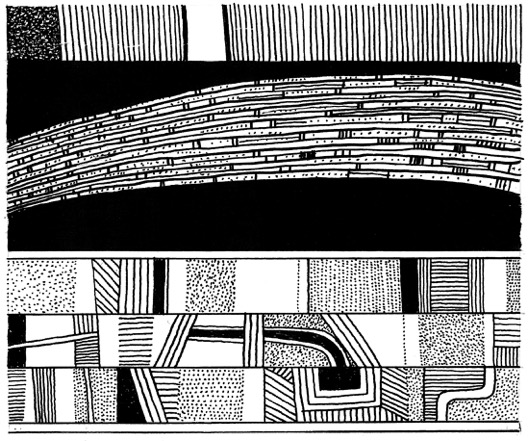
We took a fine oat-sheaf, tight bound at the waist
And set it on fire; and while it was burning
Our Lady of Otmoor rode all round the moor-edge
Until the great sheaf was just ash on the ground.
Her shining cloak circled the land that was Common
And granted forever to us local people
For kypeing of fish, for eel scuttles of osier
And fowling and keeping allotments of geese.
Many hundred’s year later, the gentry’s men came
And bound her with fences, and drained her with ditches.
They built mighty banks and stopped up the Ray.
They enclosed all our birthright and forced us all out.
So men blackened their faces and wore women’s cloaks
And ventured at night with hatchets and billhooks
And tore down the bindings. On the sixth of September
All in broad daylight, a thousand folk walked
Seven miles round the moorland, past all seven towns
Pulling down fences in spite of the Riot Act.
Sixty-six of us they arrested that day
And carted us off to the City for trial.
When we reached Oxford it was St Giles Fair
Where the holiday mob freed all of us prisoners.
We won the day, but the moor stayed a patchwork:
A hundred years passed ’til the bindings were loosed.
When the waters came home and the chessboard dissolved
They planned the M40 to drive through her middle:
Over three thousand people bought one-foot square parcels
Of Alice’s Meadow to stop them at last.
The only road now is a path full of puddles,
The Roman road’s agger is a scatter of stones.
The moor’s safe – for now – and free to the people
And the bright cloak of water is home to the birds.
From Otmoor by David Attwooll (poems) & Andrew Walton (drawings)
Black Poplar, Oxford 2016.
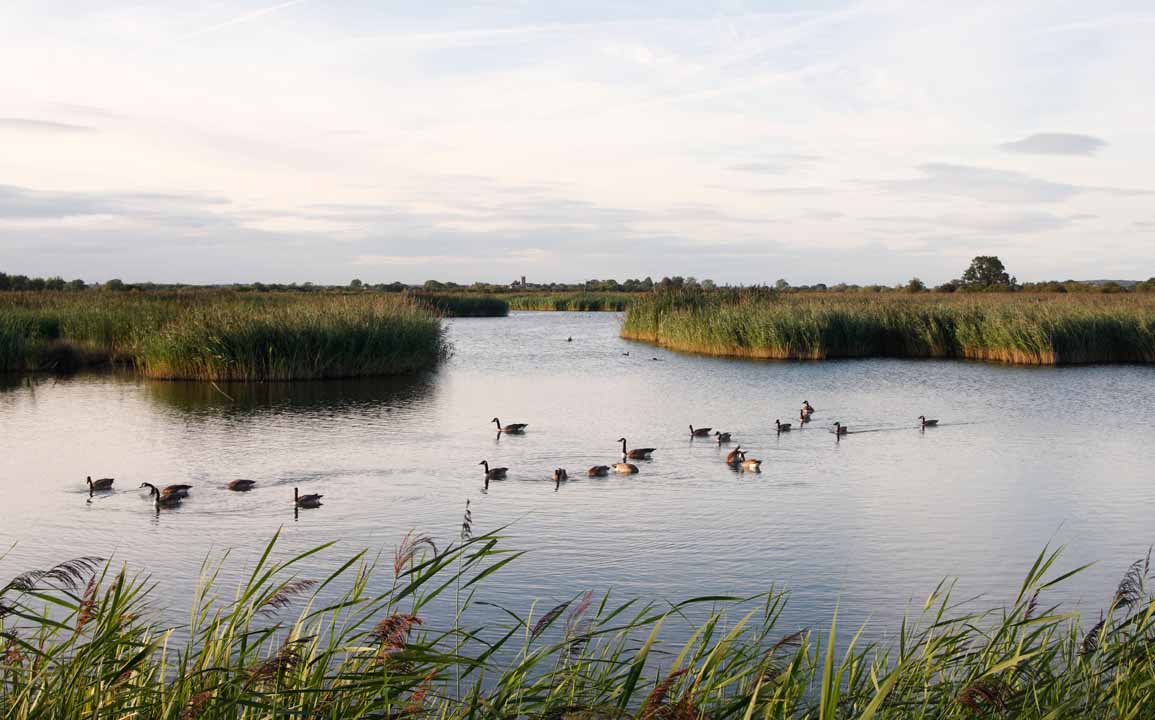
Geese swimming on flooded wetland, RSPB Otmoor Nature Reserve, Oxfordshire, England, UK. Photograph: Chris Deeney / Alamy Stock Photo
Image Sources (click to open)
Banner picture: David Bollier addressing students at Hampshire College in his home town of Amherst, Massachusetts. Photograph: Amanda Schwengel, Hampshire College.
First insert picture: An acequia in the South Valley, Albuquerque, New Mexico. This ancient system of watering an arid region has remained under commons management to this day. Photograph: Janet Worne/Alamy Stock Photo.
Other Sources (click to open)
DAVID BOLLIER:
- Website: http://www.bollier.org
- Patterns of Commoning, with SILKE HELFRICH (eds), Commons Strategy Group 2015), www.patternsof commoning.org
- Think Like a Commoner, New Society Publishers 2014;
- Green Governance: Ecological Survival, Human Rights and the Law of the Commons, with BURNS H. WESTON, Cambridge: University Press, 2013.
GARRETT HARDIN: “The Tragedy of the Commons” in Science, December 13, 1968, http://www.garretthardinsociety.org/articles/art_tragedy_of_the_commons.html
ELINOR OSTROM: Governing the Commons: The Evolution of Institutions for Collective Action, Cambridge: University Press, 1990.
MARTIN A. NOWAK: “Five Rules for evolution of cooperation” in Science, December 8, 2006, pp.1560–63. https://www.ncbi.nlm.nih.gov/pmc/articles/PMC3279745/
ANDREAS WEBER: “A Biology of Wonder” in Beshara Magazine, Issue 7, Autumn/Winter 2017,
http://besharamagazine.org/well-being-ecology/andreas-weber-a-biology-of-wonder/
DAVID ATTWOOLL (poems) & ANDREW WALTON (drawings): Otmoor, Oxford: Black Poplar, 2016.
Email this page to a friend
FOLLOW AND LIKE US
——————————————
——————————————
——————————————
FOLLOW AND LIKE US
If you enjoyed reading this article
Please leave a comment below.
Please also consider making a donation to support the work of Beshara Magazine. The magazine relies entirely on voluntary support. Donations received through this website go towards editorial expenses, eg. image rights, travel expenses, and website maintenance and development costs.
READ MORE IN BESHARA MAGAZINE
Doughnut Economics
Kate Raworth’s new book asks: how we can reconcile the needs of humanity with the needs of the planet?
A Biology of Wonder
Dr Andreas Weber talks about a new way of understanding nature
The Ecology of Money
An interview with Ciaran Mundy, Director of the Bristol Pound
The Century of Complexity
An interview with Dr Vasileios Basios on new ideas in science
READERS’ COMMENTS



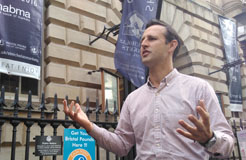

Thank you Jane Clark for a most penetrating interview. You have brought out the essence of David Bollier’s thinking, which should be made far better known than it is, both here and in the US.
Hey there, I appreciate you posting great content covering that topic with full attention to details and providing updated data. I believe it is my turn to give back, check out my website ZQ3 for additional resources about Airport Transfer.